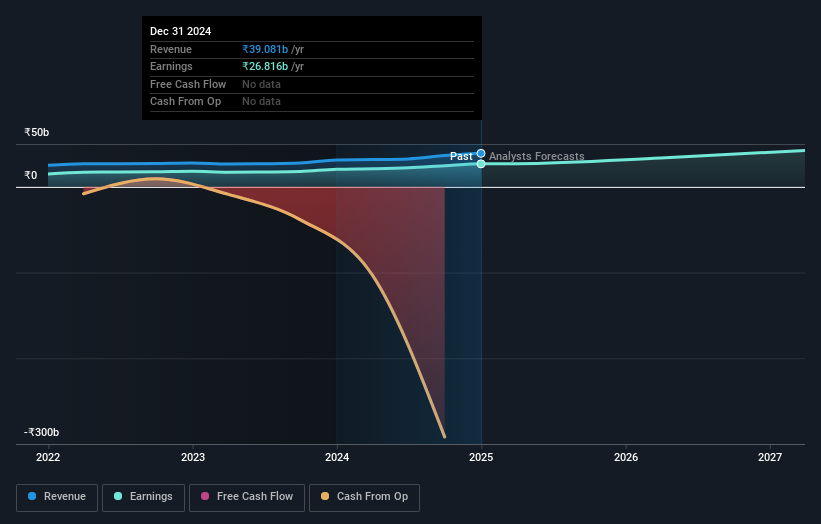- India
- /
- Diversified Financial
- /
- NSEI:HUDCO
Individual investors own 13% of Housing and Urban Development Corporation Limited (NSE:HUDCO) shares but state or government control 75% of the company

Key Insights
- Significant control over Housing and Urban Development by state or government implies that the general public has more power to influence management and governance-related decisions
- The largest shareholder of the company is India with a 54% stake
- Institutional ownership in Housing and Urban Development is 12%
Every investor in Housing and Urban Development Corporation Limited (NSE:HUDCO) should be aware of the most powerful shareholder groups. The group holding the most number of shares in the company, around 75% to be precise, is state or government. That is, the group stands to benefit the most if the stock rises (or lose the most if there is a downturn).
Meanwhile, individual investors make up 13% of the company’s shareholders.
In the chart below, we zoom in on the different ownership groups of Housing and Urban Development.
See our latest analysis for Housing and Urban Development

What Does The Institutional Ownership Tell Us About Housing and Urban Development?
Many institutions measure their performance against an index that approximates the local market. So they usually pay more attention to companies that are included in major indices.
As you can see, institutional investors have a fair amount of stake in Housing and Urban Development. This can indicate that the company has a certain degree of credibility in the investment community. However, it is best to be wary of relying on the supposed validation that comes with institutional investors. They too, get it wrong sometimes. It is not uncommon to see a big share price drop if two large institutional investors try to sell out of a stock at the same time. So it is worth checking the past earnings trajectory of Housing and Urban Development, (below). Of course, keep in mind that there are other factors to consider, too.

Housing and Urban Development is not owned by hedge funds. Our data shows that India is the largest shareholder with 54% of shares outstanding. This implies that they have majority interest control of the future of the company. Meanwhile, the second and third largest shareholders, hold 21% and 7.4%, of the shares outstanding, respectively.
Researching institutional ownership is a good way to gauge and filter a stock's expected performance. The same can be achieved by studying analyst sentiments. There is a little analyst coverage of the stock, but not much. So there is room for it to gain more coverage.
Insider Ownership Of Housing and Urban Development
The definition of company insiders can be subjective and does vary between jurisdictions. Our data reflects individual insiders, capturing board members at the very least. The company management answer to the board and the latter should represent the interests of shareholders. Notably, sometimes top-level managers are on the board themselves.
I generally consider insider ownership to be a good thing. However, on some occasions it makes it more difficult for other shareholders to hold the board accountable for decisions.
We note our data does not show any board members holding shares, personally. Not all jurisdictions have the same rules around disclosing insider ownership, and it is possible we have missed something, here. So you can click here learn more about the CEO.
General Public Ownership
The general public, who are usually individual investors, hold a 13% stake in Housing and Urban Development. This size of ownership, while considerable, may not be enough to change company policy if the decision is not in sync with other large shareholders.
Next Steps:
It's always worth thinking about the different groups who own shares in a company. But to understand Housing and Urban Development better, we need to consider many other factors. Like risks, for instance. Every company has them, and we've spotted 2 warning signs for Housing and Urban Development (of which 1 shouldn't be ignored!) you should know about.
Ultimately the future is most important. You can access this free report on analyst forecasts for the company.
NB: Figures in this article are calculated using data from the last twelve months, which refer to the 12-month period ending on the last date of the month the financial statement is dated. This may not be consistent with full year annual report figures.
Valuation is complex, but we're here to simplify it.
Discover if Housing and Urban Development might be undervalued or overvalued with our detailed analysis, featuring fair value estimates, potential risks, dividends, insider trades, and its financial condition.
Access Free AnalysisHave feedback on this article? Concerned about the content? Get in touch with us directly. Alternatively, email editorial-team (at) simplywallst.com.
This article by Simply Wall St is general in nature. We provide commentary based on historical data and analyst forecasts only using an unbiased methodology and our articles are not intended to be financial advice. It does not constitute a recommendation to buy or sell any stock, and does not take account of your objectives, or your financial situation. We aim to bring you long-term focused analysis driven by fundamental data. Note that our analysis may not factor in the latest price-sensitive company announcements or qualitative material. Simply Wall St has no position in any stocks mentioned.
About NSEI:HUDCO
Housing and Urban Development
Provides loans and financing for housing and urban development projects in India.
Proven track record and fair value.
Similar Companies
Market Insights
Community Narratives



